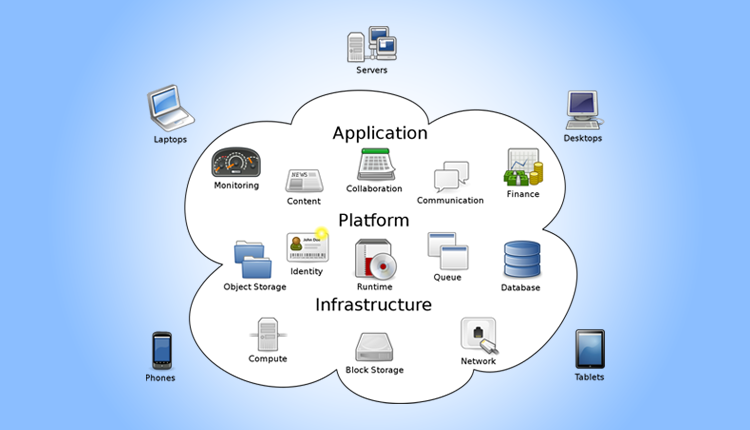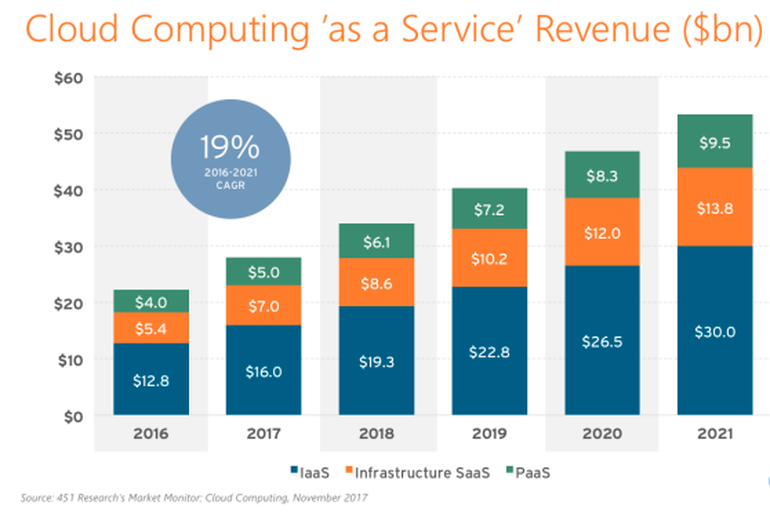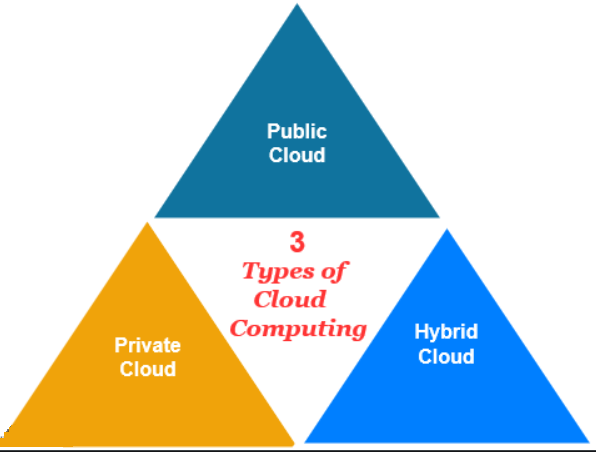
Cloud Computing is the delivery of high demanding resources such as databases, servers, data storage, networking, and different types of software over the Internet (the Cloud). This is one of the best ways to grow your business from any location. It combines all the data on a single unified cloud platform where multiple users can easily access files and other data by direct login into it.
It is a special type of data center or data infrastructure which does not own by the company, rather they take it as rent from cloud service providers so that the other parties will manage all the data from the application to storage.
The main aim of using Cloud Computing Services is that it has low operating costs and combines the different departments into one unified platform. It is a pay-for-use service means we pay for what we use.

Cloud Computing Revenue by 451 Research’s Market Monitor
Why Cloud Computing Required & Its Benefits?
We all know that how people are working well and organizations are going well with their work during this pandemic. It all works because of Cloud Computing as it carries all the internal functioning and operation under itself. Companies or organizations do not have to use multiple technical teams, a single technical team in Cloud computing will do all the work by themselves.
Let’s understand the major benefits of Cloud Computing
1. Cost-Efficient
Companies do not have to buy complete hardware and software tools, instead, they take them for rent. They usually save much money by eliminating hardware and software costs, setting up and running up complete data centers. Before Cloud Computing what they need to do, they need to buy different software for different departments and areas of the company but now since all the software is combined into a single unified platform then, it becomes easy for all the users to access the data easily.
2. Unlimited Storage
The cloud word itself means a lot of space. Similarly, cloud computing provides a lot of space even after storing unlimited data of organizations, they save all the data as n+1, that if one destroys the other will remains safe. They try their best to manage all the space as they work according to the needs of organizations, and can maintain the storage facility downgraded with fewer clients and changes its plan to upgrade when needed.
3. Easy-To-Access
Cloud Computing provides real-time updates and allows the users to access the data from different devices from any location in the world. It also manages the day-to-day business activities and also captures which work has been done and which are not done. Also, it observes the working of different employees who are doing the work more productively and who is not. Basically, it is easy to track the data as well as the human resources.
4. Performance
Users will be able to observe that Cloud Computing increases its performance day-by-day making a fast change in growing the business. The upgradation of the latest and newest features of software and hardware will take place automatically without any disruption. Working on over a single data center, will reduce the latency of the network and increase the greater business economies.
5. Highly Secure and Reliable
The data which we store on the Cloud Computing platform provides us the high security and saves the data automatically. Different Cloud Service providers provide different sets of policies to strengthen our data which is definitely good to use to save our data from reliable, potential threats. The platform is highly reliable which works on proper backing up of data and protects the data from all errors and threats. With that, the technical team works at its best, 24/7, to solve the problem instantly without waiting for a correct time to solve it.
6. More Productive
While working on a personal data center, requires a lot of time for setting up and racking-up of the hardware and other management systems. But through the use of Cloud computing, it becomes easy to save a lot of time, and that time will easily be able to spend on other management tasks and to achieve more and more business goals.
7. Scalability
The platform is easy-to-use, saves more upfront costs, saves more energy and power and the main thing of using this is that companies pay for what they really need which is really beneficial as they can do more investment and can build other startups linking with the organization. Whenever the company wants to decrease the resources, they just need to inform and can easily meet the changes according to their demands.
Different types of Cloud
There are basically 3 different types of Cloud in Cloud Computing that are public cloud, private cloud, and hybrid cloud. These are defined according to different locations, requirements of the users and provides the desired results according to the needs of the user.

1. Public Cloud
Public cloud is completely managed by third-party cloud servers that provide the resources like databases, storage, and servers over the Internet. All the services and other infrastructure operations will be accessed by many organizations. It is cost-effective as it saves the upfront costs and the cloud service provider will itself handle and manage all the services.
2. Private Cloud
A private cloud is a different type of cloud that is being coordinated and infrastructed by a single business. In this, there will be more access of resources as there is only a single organization. It also provides a high level of security and a particular business can easily customize it according to the needs.
3. Hybrid Cloud
Hybrid cloud is basically a combination of both the private and the public cloud and thus, it’s a good option. This provides a more appropriate IT solution that works and meets the needs of the users. It is highly scalable and flexible and enhanced more data security.
Different types of Cloud Services
The cloud computing services are mainly divided into 3 broad categories- IaaS, SaaS, and PaaS. All these are different in nature and offer different services in terms of business.
1. IaaS (Infrastructure as Business)
IaaS is a cloud service provider that provides an on-demand infrastructure and works at a pay-and-use service. It manages the proper memory consumption and provides scalable resources. Ability to manage proper networks including routers and switches. Offer High Storage solution that can be easily managed over HTTP.
2. PaaS (Platform as a Business)
PaaS is a different type of cloud service where developers have to take care of the complete application life cycle. It includes deployments, testing, development, and maintenance. Through this, it is easy for organizations to manage and maintain cost-effective and complex processes. It minimizes all the costs and makes the development life cycle easy.
3. SaaS (Software-as-a-Service)
In SaaS, the service providers host the software data on servers and all the work will be done on the basis of the subscription process. In other cloud services, IT people have to download the Software, but in this, users can easily login using the password in an application via the web browser.
Uses of Cloud Computing
By reading the blog, we already understood what is Cloud Computing. Now, let’s see what is the use of Cloud Computing:
- Build the Applications – It is easy to quickly build, deploy and scale cloud-native applications.
- Cost-Effective- It is easy to store, backup, and recover the data at a good scale in a cost-efficient manner.
- Software on-demand SaaS – On-demand software delivers the software according to the user’s needs and offers the latest versions and updates to the customers.
- Analyze the data- Observe and analyze the data efficiently across the teams, identify the divisions and locations. It also uses Machine Learning and Artificial Intelligence that cover the business insights for complete decisions.
End Lines
Therefore, we can say Cloud Computing provides the best services to all business sizes and works as a global provider. It provides a reliable and perfect solution according to the needs of the users. Offers more time and helps them to increase the performance of the business at global level.